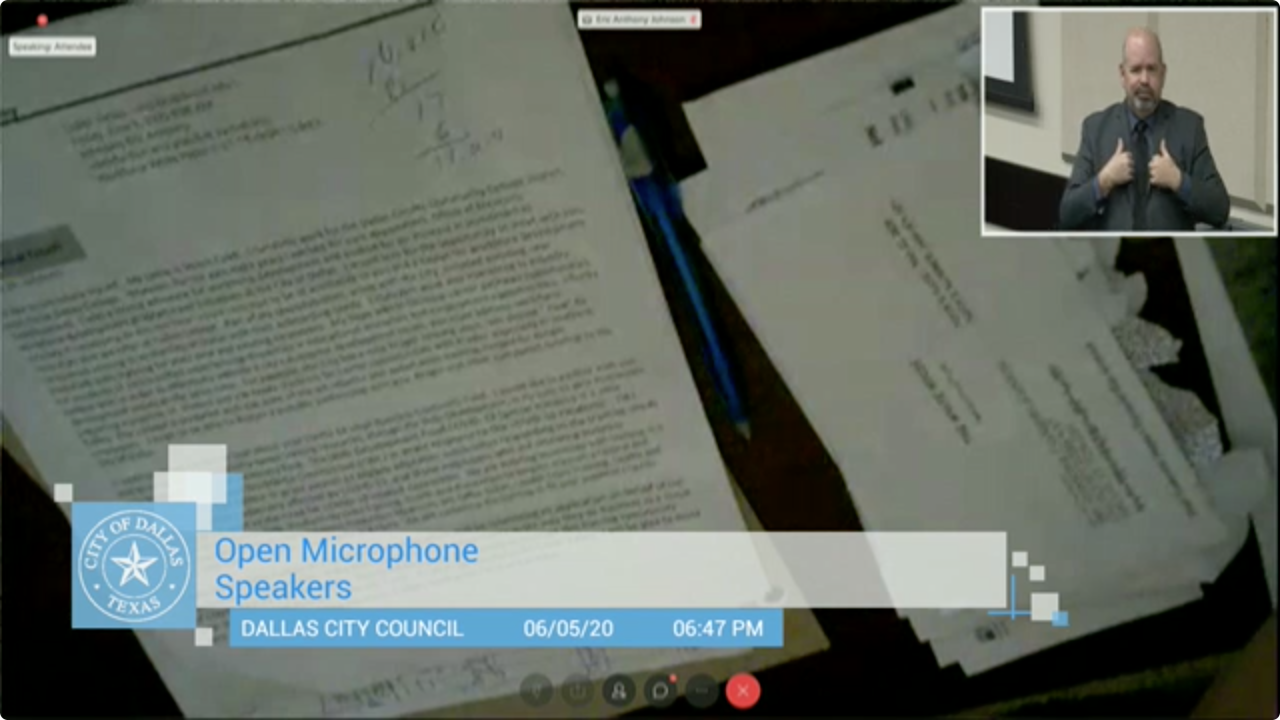Since the coronavirus pandemic began three months ago, the Dallas City Council has held its meetings virtually. The public isn’t lining up in the chambers, awaiting their minute and a half to address their representatives. They’re logged into Cisco’s Webex meeting lobby or awaiting a message from the city to dial in.
As daily protests over police brutality push into their third week, the messaging of the demonstrators has become more pronounced regarding a demand to reallocate public safety dollars for social services, housing, and other areas. The City Council will make that decision in the budget that passes in September. But citizens are having trouble adding their voices to this process.
At the first specially called council meeting since the protests, on June 5, 213 people signed up to speak. At least 50 of those were marked not present and passed over. A dozen who spoke for this article say they either never got a notice to dial in or they were not unmuted and allowed to speak into the system. Others called in through phone and logged in via Webex, which caused confusion and more technical problems.
“Webex is capable of hosting up to 10,000 participants in an event such as a council meeting,” says Catherine Cuellar, a city spokesperson. “But the participation of hundreds of speakers is what poses a challenge. The process of identifying speakers in a virtual lobby and muting and unmuting individually was what was so time consuming.”
To make matters worse, a few days later, the Dallas Citizens Police Oversight Board met for the first time since the pandemic began. But nobody could stream it; the city’s vendor had an outage. The public had to call in and listen on their phones or watch it on the city’s cable access networks. During that meeting, District 1’s controversial appointee, Janice Coffee, said, “All lives matter.” She resigned her post days later. (The video of the meeting was put online later.) And today’s budget workshop began nearly unlistenable due to lag; even the city secretary was hard to make out. It took about an hour to fix the problems.
On that special Friday afternoon meeting, the public comment portion lasted nearly six hours—despite all the people who couldn’t speak. The speakers began numerically, going off the order in which they registered. But staff had trouble finding some of the speakers in the queue. After briefly toying with the idea of unmuting the 100-plus public speakers all at once, the Council decided to go out of order, using the speakers who were queued up and easiest to find in the lobby. There was no way to know when your turn to speak would come.
Sound frustrating? Victoria Henderson, a public school teacher, was registered as speaker 55 of 213. It took her five hours to join the meeting, after not receiving an email with a link to the Webex lobby. Sara Mokuria, a co-founder of Mothers Against Police Brutality and an associate director at UTD’s Urban Policy Institute, said she couldn’t hear her name called and had to turn to her council contacts to get her name back to the list. Obviously, not everyone has that option. Amber Bemak said she never got a phone call for her to speak.
“There was no way to be there. There was no number,” Bemak says. “They just told me they would call me.”
Bemak and Henderson wanted to advocate for defunding the police department. Mokuria, after she got through, spoke about strengthening the Police Oversight Board.
The City Council has had technical problems since the pandemic began. Most are comically frustrating user error. There has been a whole lot of forgetting to hit their own mute buttons. At one point during that special Friday meeting, a city staffer clicked in on a separate phone call and unknowingly took over the feed for a few minutes. Mayor Eric Johnson was visibly frustrated. But he was the only person on Council that people could see in the online video feed. Cuellar says Webex doesn’t allow for a gallery view to show all 15 individual screens. As Tim noted last week, there’s no way for the public to know whether everyone is paying attention the whole way through.
“It’s pretty new in offering gallery functionality at all,” she adds.
But … it seems that Webex can provide a view of the entire Council, at least when content is not being shared. Like during public comment. At a time when residents want to be heard, the city needs to ensure that its tech can stand up to the demand. A new chief information officer started this week at the city. “I was on his calendar from the first day on the job,” Cuellar says.
As noted above, the Council’s budget workshop has begun. The stream is stuttering and the first few speakers didn’t make it through their audio problems. Many others are being skipped over and being marked as not present. And when an IT staffer came on to help, he sounded so distorted that you couldn’t make out what he was saying.
I’d like to tell you his name, but the image was so poor it was illegible.





